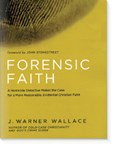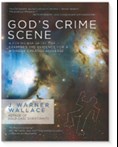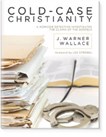Teddy James
AFA Journal staff writer
Above, J. Warner Wallace
June 2017 – Imagine a wreck on the highway. In many cases, especially if the wreck is severe, three teams will respond: police, firemen, and paramedics. Each team is different with different responsibilities.
In this scenario, you would have high expectations for each. Police officers will direct traffic and keep the area as safe as possible; fire fighters will help if a person is trapped in the wrecked vehicle; and paramedics will administer medical care.
“If all first responders did during training was talk and eat donuts, you wouldn’t trust us to get the job done when we showed up,” author, speaker, and apologist J. Warner Wallace told AFA Journal. “In fact, if we didn’t know how to do it, we would only serve to make it worse. But we do know what to do because we trained and we trained hard.”
Wallace, a veteran police officer and cold case detective from California, says Christians should take this truth and apply it to their religious beliefs.
Teaching and training
In his latest book, Forensic Faith, Wallace said churches should lean less toward teaching and more toward training.
“Teaching is focused on imparting knowledge,” he explained. “Training is focused on preparing for a challenge. Teaching is vitally important, but training puts that teaching into practice. Boxers train. First responders train. Military personnel train. Why? Because they’re eventually going to deploy into the ring, the fighting cage, the street, or the battlefield. These people know they’re going to be challenged and tested. Unless they prepare for this inevitable reality, they’re going to get hurt.”
But Wallace’s experience tells him Christians in America don’t see the importance of training for the inevitable challenges they will face in the world.
“I didn’t realize I would have to write a book like Forensic Faith,” he said. “But while I was touring for Cold-Case Christianity, the people I came in contact with felt no need to examine the evidence for why Christianity might be true.”
Wallace said he would routinely have to make a case for the need to make a case for Christianity among Christians. During numerous conversations with people in churches, Wallace would hear, “I’m already a Christian. I don’t need apologetic information,” or “All the people I know who came to the faith didn’t need that, so why should we talk about it?”
“That’s why I had to write Forensic Faith,” Wallace said. “It makes the case for making the case.”
That approach sets his latest book apart from the vast majority of apologetic-centered works on the market today. It focuses on the training, on helping the reader think like a case-making Christian.
Training and action
Even the best training in the world is useless if it is never put into action. When Wallace became a Christian, he didn’t have a choice but to start exercising apologetics.
His father’s second wife is a Mormon and he has six brothers and sisters in the Mormon religion. He says Christians and Mormons make very different claims about Jesus, God, salvation, and the nature of reality but give similar answers when asked why they belong to their religious communities.
“It is typically the same three responses,” Wallace said. “People say they were raised in it, had a personal experience confirming it, or it has had a positive impact on their lives.”
The problem is that none of these reasons explain the validity or reliability of the religion.
“They have competing and contradicting claims, and both cannot be true,” Wallace said. There are many other areas where Christians can put apologetic training into action. Over the last decade, America has seen massive cultural shifts.
“If you were to survey America today, you might find 70% still claim to be Christian,” he estimated. “But if you compared that to the number of people who understand what Scripture teaches and hold classic, orthodox views of Christianity, the number would be much smaller.”
The cultural shift is centered on many ideas antithetical to the teachings of Jesus, but the primary wedge issue is sex and sexuality, according to Wallace.
“If you think no one is really persecuting Christians,” Wallace said, “remember that any attack on your Teacher, your Master, is an attack on the whole system. The moral teachings of Jesus as related to marriage, sexuality, and sanctity of life have already been thrown under the bus. If we are going to engage culture, we must know how to make the biblical case for these things.”
Action and application
Part of Wallace’s purpose for Forensic Faith is to show how principles and training exercised by police, detectives, and prosecutors can apply to Christians in conversations with lost friends and family. One of the most important aspects in that regard is choosing the right jury.
“I have been around great prosecutors who have failed and succeeded based on their jury selection. There are lots of other variables, but you can lose a case before your opening statement if you are talking to the wrong jury.”
In that regard, for the Christian witness, knowing the person you are talking to about Jesus is important. Is he apathetic or vitriolic toward God, or is he seeking truth? These are things you can learn in a few moments and adjust the way you present the Scripture accordingly.
Most Christians have known people for years who do not know Jesus. Wallace says to schedule a discussion with them.
“I look at boxers and mixed martial arts fighters. They don’t train year-round. They stay in good shape, but they don’t really train until they have a fight on the calendar. If we know we are going to talk to someone in two, six, or twelve weeks, we will have the drive we need to train well. We will also be able to prepare for specific objections they will bring to the discussion.”
That training does not have to be academic, scholarly, or expensive. The modern age is called the Information Age for a reason. Resources are readily available on the Internet and in local libraries across the country. Although books tend to be more concise and collected, there are free videos, articles, and resources at your fingertips. (See below.)
“You honestly do not have to buy anything to become a good Christian case maker,” Wallace said. “You just need to know where the resources are and study them. If you want to do it, and you should because we are commanded to, you have no excuse not to.” 
J. Warner Wallace online
ColdCaseChristianity.com – an approachable selection of articles, videos, and podcasts about apologetics, faith, theology, and the Christian life.
____________________
Books by Wallace



